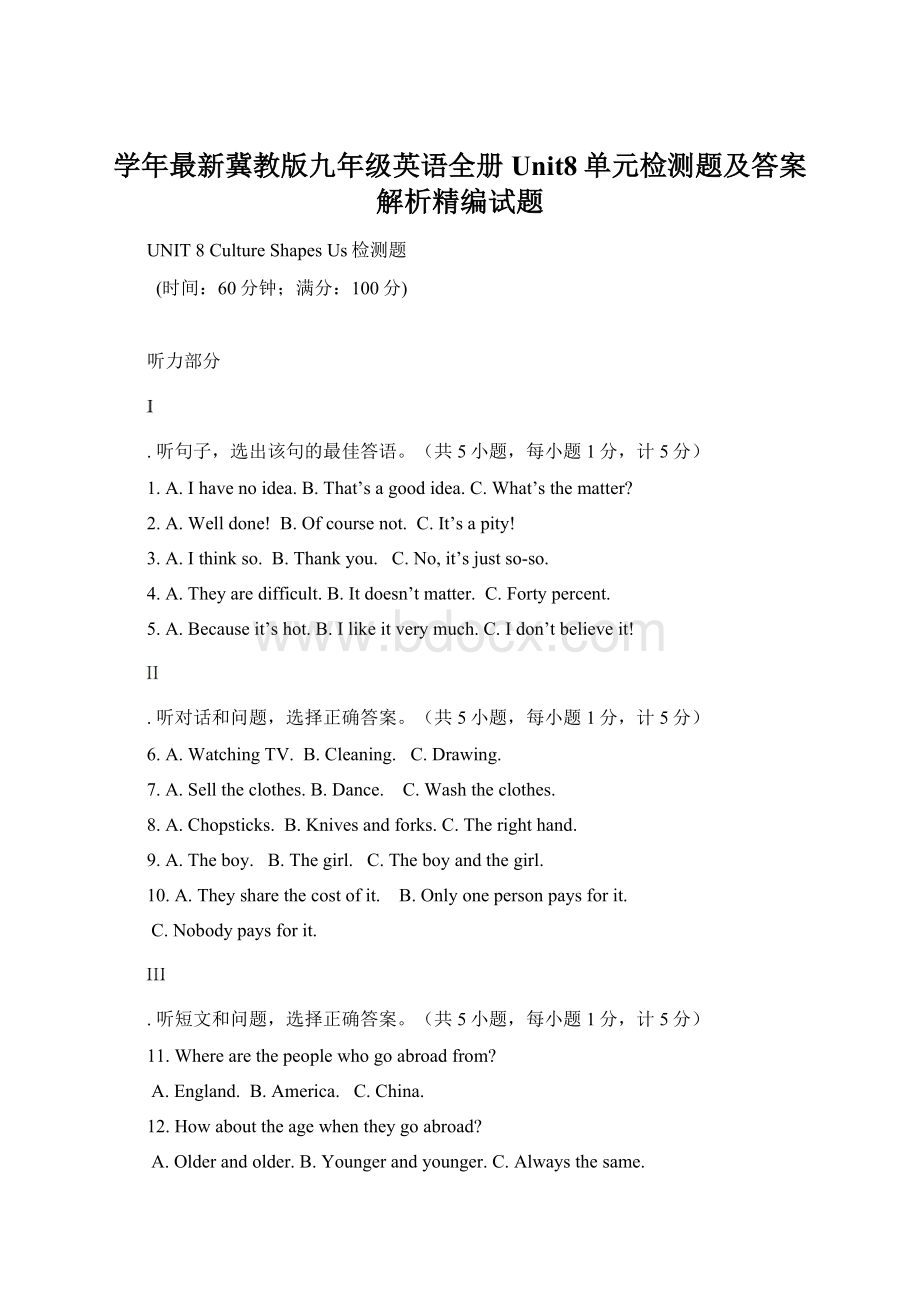学年最新冀教版九年级英语全册Unit8单元检测题及答案解析精编试题.docx
《学年最新冀教版九年级英语全册Unit8单元检测题及答案解析精编试题.docx》由会员分享,可在线阅读,更多相关《学年最新冀教版九年级英语全册Unit8单元检测题及答案解析精编试题.docx(14页珍藏版)》请在冰豆网上搜索。

学年最新冀教版九年级英语全册Unit8单元检测题及答案解析精编试题
UNIT8CultureShapesUs检测题
(时间:
60分钟;满分:
100分)
听力部分
.听句子,选出该句的最佳答语。
(共5小题,每小题1分,计5分)
1.A.Ihavenoidea.B.That’sagoodidea.C.What’sthematter?
2.A.Welldone!
B.Ofcoursenot.C.It’sapity!
3.A.Ithinkso.B.Thankyou.C.No,it’sjustso-so.
4.A.Theyaredifficult.B.Itdoesn’tmatter.C.Fortypercent.
5.A.Becauseit’shot.B.Ilikeitverymuch.C.Idon’tbelieveit!
.听对话和问题,选择正确答案。
(共5小题,每小题1分,计5分)
6.A.WatchingTV.B.Cleaning.C.Drawing.
7.A.Selltheclothes.B.Dance.C.Washtheclothes.
8.A.Chopsticks.B.Knivesandforks.C.Therighthand.
9.A.Theboy.B.Thegirl.C.Theboyandthegirl.
10.A.Theysharethecostofit.B.Onlyonepersonpaysforit.
C.Nobodypaysforit.
.听短文和问题,选择正确答案。
(共5小题,每小题1分,计5分)
11.Wherearethepeoplewhogoabroadfrom?
A.England.B.America.C.China.
12.Howabouttheagewhentheygoabroad?
A.Olderandolder.B.Youngerandyounger.C.Alwaysthesame.
13.Whatwilllifebeforthepeoplethere?
A.Easy.B.Hard.C.Happy.
14.Whatdothepeoplehavetoface?
A.Culturedifferences.B.Languageproblems.
C.Culturedifferencesandlanguageproblems.
15.What’sthemostdifficultthingtheyneedtoovercome?
A.Controllingthemselveswell.B.Studyingaloneinastrangecountry.
C.Workinghardwhentheyareatschool.
.听短文填空。
(共5小题,每小题1分,计5分)
InformationSheet
16.Thetipsareabouthowtobeawhenpeoplegotoadinnerparty.
17.Tobringorsomedrinksasapresentisagoodidea.
18.Weshouldarriveontimeornotmorethan.
19.Trytoatthedinnertable.
20.Tothankthehostessandhostforthemeal,aisneeded.
笔试部分
.单项选择(共15小题,每小题1分,计15分)
21.Thereisundergroundparkinglot.parkinglotisbigenough.
A.a;TheB.an;TheC.the;AD.the;An
22.—Whatwouldyouliketoeat?
—rice,please.
A.AbowlB.BowlofC.TwobowlofD.Twobowlsof
23.Herdaughtercandoalmosteverythingbyherselfsheisonlysix.
A.ifB.becauseC.althoughD.so
24.MypenpalcametoChinawithusduringtheSpringFestival.
A.stayB.tostayC.stayingD.stayed
25.—Doyouthinkthatmanisanhonestperson?
—.Healwaystellslies.
A.IhavenoideaB.Itdoesn’tmatterC.It’sveryimportantD.Ofcoursenot
26.youbelieveitornot,it’sarealstory.
A.WhileB.UnlessC.WhetherD.Until
27.Thecanbecomearule.
A.seasonB.customC.stepD.poster
28.Herlifecolorfulstories.
A.wasfullofB.wasfilledC.fullofD.filledwith
29.Towinthematch,wemustworkateam.
A.withB.byC.asD.from
30.Myskirtissimilaryours.
A.withB.aboutC.inD.to
31.theyaretwinsisters,theydon’tlookthesame.
A.SinceB.AsC.ThoughD.Because
32.Imagineyou’reapassengeronatrain.Whatdoyouthinkofacupoftea?
A.offerB.toofferC.offeringD.beingoffered
33.Eachofusshouldenteringthemeetingroom.
A.taketurnsB.takeafterC.takeplaceD.takesteps
34.—Iwanttoknoweatoutintherestaurant.
—We’llgothereassoonasourhomework.
A.whencanwe;isdoneB.whenwecan;isdone
C.whencanwe;willbedoneD.whenwecan;willbedone
35.—WuDong,yourEnglishissoexcellent!
—
A.Oh,no,myEnglishisstillverypoor.B.Howdoyouknowthis?
C.Thankyou.D.Really?
.完形填空(共10小题,每小题1分,计10分)
TherearemanydifferencesbetweenChineseeatinghabitsandWesterneatinghabits.IntheWest,everyonehastheirown36offood.ButinChinathedishesare37onthetableandeveryoneshares.IfyouarebeingtreatedbyaChinesehost,theremustbe38foodpreparedforyou.Chinesearevery39oftheircultureandwilldotheirbesttoshowtheirhospitality(好客).
AndsometimestheChinesehostusestheir40toputfoodinyourbowlorplate.Thisisasignofpoliteness.Theproperthingtodowouldbetoeatthewhatever-it-isandsayhow41itis.Ifyoufeeluncomfortablewiththis,youcanjustsayapolite“Thanks”andleavethefoodthere.Don’t42yourchopsticksuprightintothericebowl.Instead,lay(放置)themonyourdish.Thereasonforthisisthatwhensomebody43,theshrine(神祠)tothemhasabowlofsandorricewithtwochopstickswhicharestuckuprightinit.Itisimpolitetosettheteapotdownwherethespout(壶嘴)isfacing44somebody.Thespoutshouldalwaysbedirectedtowherenobodyissitting,usuallyjustoutward(向外)fromthetable.
Don’thitonyourbowlwithyourchopsticks.Beggars(乞丐)hitontheirbowls,sothisisnotpolite.Also,whenthefoodiscomingtoo45inarestaurant,peoplewilltaptheirbowls.Ifyouareinsomeone’shome,itislikeoffendingthecook.
36.A.tableB.plateC.favoriteD.meal
37.A.madeB.cookedC.eatenD.placed
38.A.abitofB.abitC.alotofD.alittle
39.A.afraidB.tiredC.proudD.certain
40.A.knivesB.forksC.handsD.chopsticks
41.A.deliciousB.beautifulC.terribleD.comfortable
42.A.fallB.throwC.jumpD.stick
43.A.comesB.goesC.diesD.lives
44.A.againstB.towardsC.overD.above
45.A.oftenB.earlyC.slowlyD.fast
.阅读理解(共15小题,每小题1分,计15分)
A
Allaroundtheworld,peopledrinktea.Butteadoesnotmeanthesamethingtoeveryone.Indifferentcountries,peoplehaveverydifferentideasaboutdrinkingtea.
InChina,forexample,peoplealwaysdrinkteawhentheyaregoingtogether.TheChinesedrinkitatanytimeofthedayathomesorinteahouses.Theyprefertheirteaplain,withnothingelseinit.
TeaisalsoimportantinJapan.TheJapanesehaveaspecialwayofservingteacalledteaceremony(典礼).Itisveryoldandfullofmeaning.Everythingmustbedoneinaspecialwayintheceremony.ThereisevenaspecialwayforitinJapanesehomes.
Anothertea-drinkingcountryisEngland.InEngland,thelateafternoonis“teatime”.Almosteveryonehasacupofteathen.TheEnglishusuallymaketeainateapotanddrinkitwithmilkandsugar.Theyalsoeatcakes,cookiesandalittlesandwichesatteatime.Thisissocalled“AfternoonTea”inBritain.
IntheUnitedStates,peopledrinkteamostlyforbreakfastoraftermeals.Americansusuallyuseteabagstomaketheirtea.Teabagsarefasterandeasierthanmakingteainteapots(茶壶).Insummer,manyAmericansdrinkcoldtea.Sometimestheydrinkicedteafromcanslikesoda(汽水).
46.Teaispopular.
A.allaroundtheworld
B.onlyinEnglish-speakingcountries
C.onlyintheUnitedStates
D.inJapan,ChinaandotherAsiancountries
47.TheChinesedrinktea.
A.forbreakfastB.atanytimeoftheday
C.onlyinteahousesD.inaspecialceremony
48.TheEnglishliketodrinktheirtea.
A.inaspecialroom
B.withdinner
C.whiletheyeatcakesandcookies
D.whentheyarefree
49.Theword“plain”in“Theyprefertheirteaplain,withnothingelseinit.”means“”.
A.朴素的B.平坦的C.不掺杂的D.直率的
50.Inthispassage,whichcountry’swayofdrinkingteaisn’tmentioned?
A.England.B.America.C.Japan.D.India.
B
Peopleindifferentcountriesbehave(举止)indifferentways.Whatispoliteor“goodmanners(礼貌)”inonecountrymaynotbepoliteinanother.Forexample,Americansusuallygreet(打招呼)someonetheyknowbysaying,“Hi”“Hello”or“Goodmorning”.WeChinese,ontheotherhand,usuallygreeteachotherbysaying,“Howareyou?
”orsometimes“Haveyoueaten?
”or“Whereareyougoing?
”ButitisbadmannerstogreetanAmericanbyaskinghimwhereheisgoingorifhehaseaten.InItaly(意大利)orinthesouthofFrance,amanwillgreetawomanbykissing(吻)heronthebackofherhandoronbothcheeks(脸颊).ButinChinaandotherAsian(亚洲)countries,kissingonmeetingsomeoneisthoughttobebadmanners.
Totakeanotherexample,belching(打嗝)duringamealinAmericaisthoughtveryrude(无礼节的)whileinpartsofChinaandtheArab(阿拉伯人)world,belchingisawayoftellingyourfriendthatyouareenjoyingyourmeal.
Therearealsodifferentwaysofpayingavisittoother’shome,standinginline,introducing(介绍)someonetootherpeople,andgivingthanks.Forexample,ifanAmericanbringssomeoneapresent,hehopesitwillbeopenedinfrontofhim.ButweChinesedon’tusuallyopenthepresentuntilhehasleft.
Whataretherules(规则)ofgoodmannersthen?
Well,therearetoomanyrulestobewrittendownhere.Themostimportantonewouldbe:
WheninRome(罗马),doastheRomans(罗马人)do.
51.AmaninItalygreetsawomanby.
A.kissingthebackofherhandorcheeksB.asking“Whereareyougoing?
”
C.asking“Howareyou?
”D.saying“Hello”
52.InAsiancountriesitistokissawomanwhentheymeeteachother.
A.politeB.rudeC.goodD.nice
53.ThepeopleinAsiancountriesusuallygivealoudbelchtoshowthattheyenjoytheirmeal.
A.allB.someC.noD.most
54.Ifa(n)givessomeoneapresent,hewantshimorhertoopenitinfrontofhim.
A.ChineseB.JapaneseC.AmericanD.Indian
55.Themostimportantruleofgoodmannersis.
A.tobeontimeB.tobeyourself
C.wheninRome,doastheRomansdoD.tohaveagoodtime
C
Frogsareanimalsthatcanlivebothinwaterandonland.Therearemorethan5,000kindsoffrogsontheearth.Theearliestknownfrogslivedabout190millionyearsagoandthefrogstodaystilllookthesame.Herearesomefunthingsthatyoumightnotknowaboutfrogs.Enjoy!
·TheBiggestandtheSmallestFrogs
Somefrogscanbeverybig.ThebiggestkindoffrogistheGoliathFroginWestAfrica.Itsbodycanbenearly30cmlong,aboutthesiz